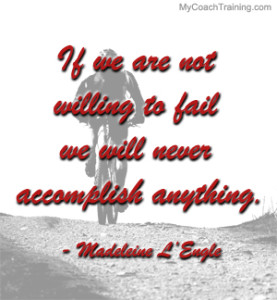 “If we are not willing to fail we will never accomplish anything. All creative acts involve the risk of failure.”
“If we are not willing to fail we will never accomplish anything. All creative acts involve the risk of failure.”
― Madeleine L’Engle, Two-Part Invention: The Story of a Marriage
As a child, I was the student who wanted to excel in everything – and for the most part, I did. However, as life became more complex and demanding, I quickly learned that “failure is not an option” was not a reasonable philosophy on which to base my life.
In fact, by not accepting failure, I generated a colossal amount of stress and began avoiding any sort of risks. Eventually, I found myself frozen, unable to take action on anything.
Tim Harford, author of Adapt: Why Success Always Starts with Failure, says that understanding failure is actually the key to success. Here are his three principles of failure:
- Be willing to fail . . . a lot. You don’t know what will work until you are willing to try and fail. This doesn’t mean you have to fail, it just means that you should be able to accept the possibility.
- Fail on a survivable scale. Being willing to risk failure is important, but you should be smart about it. If you can’t survive the risk, then you might want to start smaller or try something else.
- Learn to spot a failure and fix it early. Think about it this way: if you can withstand failure skillfully, then you can attain success skillfully. You’ll have the experience and courage necessary to take action on your dreams and make them a reality. However, this only works if you can learn from your failures and adjust accordingly.
I would add a fourth principle to this: Experiment with failure. Harford talks about the importance of this in Adapt:
“. . . whether we like it or not, trial and error is a tremendously powerful process for solving problems in a complex world, while expert leadership is not.” He goes on to say, “We will have to make an uncomfortable number of mistakes, and learn from them, rather than cover them up or deny they happened, even to ourselves.”
In his book, Harford shows us through stories of companies and people, big and small, that failure is simply a part of the process. Success comes not from trying to predict the future of events, but from being able to adapt.
During the Logical Soul® Life Coach Certification, Dr. Craig reminded us over and over again that we have to be comfortable with not knowing. When someone comes to you for help as a life coach, you have to accept that you don’t know everything about them and that you don’t have all of the answers – no matter how much you may want to.
It can be a real challenge to set aside your worries and fears during this process. You may be preoccupied with not making a mistake, or in trying to “fix” the other person. This is all ego, and gets in between you and the client. When you are comfortable with not knowing, there is no true failure. You are free to adapt to whatever comes up in a session.
The wonderful thing about the Logical Soul® is that it guides both the life coach and the client to discovering just enough to come to a resolution. There is no dogma or years of digging into someone’s past. Instead, you discover the subconscious decisions that feed what Dr. Craig calls the Seed of Failure and make a new decision to water the Seed of Success.
Still want to avoid failure? Of course you do! That’s why I recommend Dr. Craig’s free report for coaches on How to avoid the 7 biggest mistakes coaches make.






Leave a Reply